OVERVIEW
We’ll summary elements we learn from AI Platforms in the industry. Includes what is an AI Platform, what components the platform has, what can the platform do, how it going to help us achieve goals by AI. Then try to identify the key issues of AI Platform and goals it must achieve.
AI PLATFORMS
AI platforms provide users a tool kit to build intelligent applications. These platforms combine intelligent, decision-making algorithms with data, which enables developers to create a business solution. Some platforms offer pre-built algorithms and simplistic workflows with such features as drag-and-drop modeling and visual interfaces that easily connect necessary data to the end solution, while others require a greater knowledge of development and coding. These algorithms can include functionality for image recognition, natural language processing, voice recognition, recommendation systems, and predictive analytics, in addition to other machine learning capabilities.
AI platforms are frequently used by developers to create both the learning algorithm and intelligent application. However, users without intensive development skills will benefit from the platforms’ pre-built algorithms and other features that curb the learning curve. AI platforms are very similar to PaaS, which allow for basic application development, but these products differ by offering machine learning options. As intelligent applications become the norm, it may become commonplace for all PaaS products to begin to provide the same machine learning options as AI Platforms.
Top 5 AI Platform
Ease of Use, Meets Requirements, Ease of Doing Business With, Ease of Setup, Quality of Support, Ease of Admin
Google AI Platform
Google AI Platform comes with 3 important components: AI Hub, AI Building blocks and AI Platform.
AI Hub
AI Hub offers a collection of assets for developers and data scientists building AI systems. Train your ML model in a notebook or deploy it to a managed service. Find and deploy ML pipelines. Explore and reuse TensorFlow modules. Discover the best solution for serving and managing your trained model. Learn from in-depth tutorials and examples.
AI Building Block
Tools that make it easy for developers to add sight, language, conversation, and structured data to their applications.
AI Platform
This code-based data science development environment empowers machine learning developers, data scientists, and data engineers to take their projects from ideation to deployment, quickly and cost-effectively.
Console and Dashboard
Microsoft Azure AI
Microsoft Azure AI focus on 3 primary areas: AI apps & agents, Knowledge mining, Machine learning.
AI apps and agents
Deliver breakthrough experiences in your apps with Cognitive Services and Bot Service. Access industry-leading AI models that are being used today by millions in products such as Office 365, Xbox and Bing. Customize these models with your own data and deploy anywhere. Only Azure provides you with access to these battle-tested capabilities.
Knowledge mining
Only Azure empowers you with the most advanced machine learning capabilities. Quickly and easily build, train, and deploy your machine learning models using Azure Machine Learning, Azure Databricks, and ONNX. Use tools and frameworks of your choice without lock-in. Develop models faster using automated machine learning. Easily deploy and manage across the cloud and the edge.
Machine learning
Uncover latent insights from all your content — documents, images, and media — with Azure Search. Using the only cloud search service with built-in AI capabilities, discover patterns and relationships in your content, understand the sentiment, extract key phrases and more.
Console and Dashboard
Amazon Machine Learning
Amazon is focused on solving some of the toughest challenges that hold back machine learning from being in the hands of every developer.
ML Services
Amazon SageMaker enables developers and data scientists to quickly and easily build, train, and deploy machine learning models at any scale. It removes the complexity that gets in the way of successfully implementing machine learning across use cases and industries — from running models for real-time fraud detection to virtually analyzing biological impacts of potential drugs, to predicting stolen-base success in baseball.
AI Services
AWS pre-trained AI Services provide ready-made intelligence for your applications and workflows. AI Services easily integrate with your applications to address common use cases such as personalized recommendations, modernizing your contact center, improving safety and security, and increasing customer engagement. Because we use the same deep learning technology that powers Amazon.com and our ML Services, you get quality and accuracy from continuously-learning APIs. And best of all, AI Services on AWS don’t require machine learning experience.
ML frameworks & Infrastructure
Choose from TensorFlow, PyTorch, Apache MXNet, and other popular frameworks to experiment with and customize machine learning algorithms. You can use the framework of your choice as a managed experience in Amazon SageMaker or use the AWS Deep Learning AMIs (Amazon machine images), which are fully configured with the latest versions of the most popular deep learning frameworks and tools.
Console and Dashboard
Others
Alibaba Machine Learning Platform For AI
Alibaba Machine Learning Platform For AI provides end-to-end machine learning services, including data processing, feature engineering, model training, model prediction, and model evaluation. Machine Learning Platform For AI combines all of these services to make AI more accessible than ever.
IBM Watson Machine Learning
IBM Watson Machine Learning helps data scientists and developers work together to accelerate the process of moving to deployment and integrate AI into their applications. By simplifying, accelerating and governing AI deployments, it enables organizations to harness machine learning and deep learning to deliver business value.
Oracle AI
Oracle’s ready-to-build AI platform gives data scientists and application developers a range of cloud services to easily build, train, deploy, and manage AI-powered solutions. With ready-to-work Oracle Autonomous Database platforms, machine learning is working behind the scenes to automate security patching and backups and optimize database query performance. Discover how a modern cloud architecture — powered by AI — can be just what your business needs.
H2O Machine Learning Platform
H2O is a fully open-source, distributed in-memory machine learning platform with linear scalability. H2O supports the most widely used statistical & machine learning algorithms including gradient boosted machines, generalized linear models, deep learning and more. H2O also has an industry-leading AutoML functionality that automatically runs through all the algorithms and their hyperparameters to produce a leaderboard of the best models.
Polyaxon
A platform for reproducing and managing the whole life cycle of machine learning and deep learning applications. Polyaxon gives you the simplest path to quickly enable faster innovation, and develop reproducible and scalable machine learning models. Scale your data science infrastructure and innovate faster independently of the cloud provider.
SUMMARY
As you can see, different AI Platforms are shared many features in common: Provide a platform for building intelligent, AI-capable applications. Allow users to create machine learning algorithms and/or offer pre-built machine learning algorithms for more novice users to build applications. Present a way for developers to connect data to the algorithms for them to learn and adapt.
AI Platform Status
AI Accessibility
AI Platform won’t make its way into products unless we make it easy to access for everyone. The primary problem of AI Platform is a lack of accessibility. We must pay attention to unblock data accessibility, workflow accessibility, knowledge accessibility, and service accessibility.
Data Accessibility
Researchers ingest data from different sources. It’s a dirty job and never been easy. There is no such place for researchers to get a glance at all of the data, to help them to understand relationships between the data. The importance of data for AI is undeniable. AI receives inputs, or requests, for a certain function or task, and in order to output a solution, it requires access to data. The more data AI has access to the better. Researchers have to get fully understand our data in a better way. That’s why to improve data accessibility is not to be ignored.
Google, Microsoft, and Amazon all offer friendly tools to ingest and manipulate data for developers on their AI Platform.
Workflow Accessibility
From data ingestion, data labeling, data analysis, data transformation, model training, data validation, refine, re-training, deploy, evolution and serving. It’s a very common workflow for machine learning operationalization. researchers don’t share such a tool to simplify their workflow. Researchers require inevitable effort on the workflow, but most of their work is duplicate and difficult to reuse.
We must offer a tool to deploy, monitor, and manage machine learning models. Track the health and performance of deployed machine learning models. Provide a holistic management tool to better understand all models deployed across a product.
Knowledge Accessibility
AI is becoming a staple of all business software and will continue to for the foreseeable future. We don’t actually know much about AI, and how it can lead us to the coming few years. Apple, Google, Microsoft, and Amazon don’t have AI until they build a strong researcher team. Their research team writes many documentation, guide, spec, design, standard, solution, etc. And these become their AI knowledge center. Everyone can access it and learn from it so they know how to apply AI to their business and develop new domains by AI. They become an AI-driven company eventually.
Build an AI knowledge center is the top priority for AI Platform.
Service Accessibility
AI infrastructure layer, ML services layer, AI services layer, they are services of AI Platform. These services should design for each other, evolve for each other. So the AI Platform could move quickly. Especially AI services layer, we define what we should serve in this layer so we know what we need to concentrate on. AI service should be the product ready layer. AI service in Google and Microsoft all offer vision, video, translation, natural language, speech, etc.
AI Platform Must Achieve
- Develop tools to ensure that every team can access AI.
Infrastructure, service, labeling tools, QC, analysis-tools, monitor, automation, console, dashboard, command-line tools, lib/framework/SDK/API. etc.
- Build a knowledge center to guide every team to achieve goals by AI.
Documentation, spec, design, standard, solution, algorithm. etc.
- Delivery high-quality AI to products.
Recommendation, search, campaign, marketing, personalization, playback metadata, adaptive bitrate. etc.
- Apply AI tech to new domains.
Smart video Ads, AR/VR, Speech. etc.
RESOURCES
Google AI Hub: The One Place for Everything AI (Cloud Next ‘19)
Azure AI: Making AI real for every developer and every organization
Amazon Invent 2018: Presentations from M&E-related Sessions, and the YouTube Video.
Alibaba Machine Learning Platform For AI, Architecture, Aliyun PAI
Enterprise AI and machine learning: Comparing the companies and applications
Comparing Machine Learning as a Service: Amazon, Microsoft Azure, Google Cloud AI, IBM Watson
Enterprise AI and machine learning: Comparing the companies and applications
Comparing Machine Learning as a Service: Amazon, Microsoft Azure, Google Cloud AI, IBM Watson

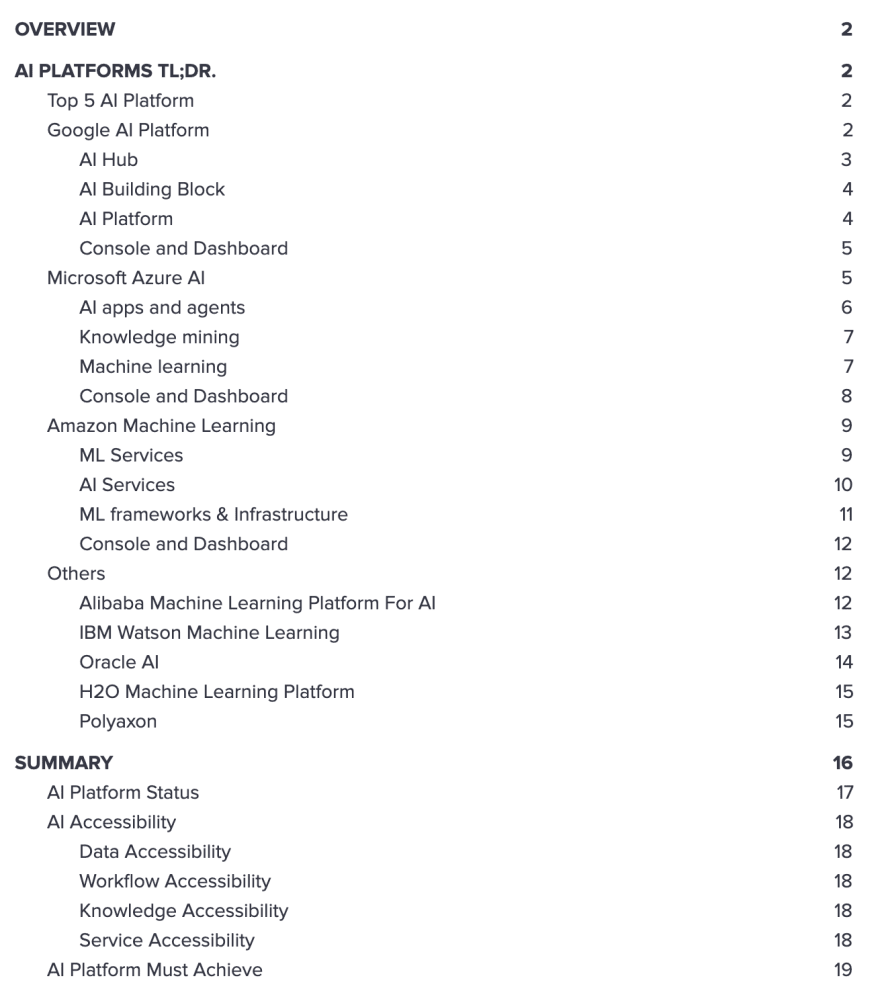

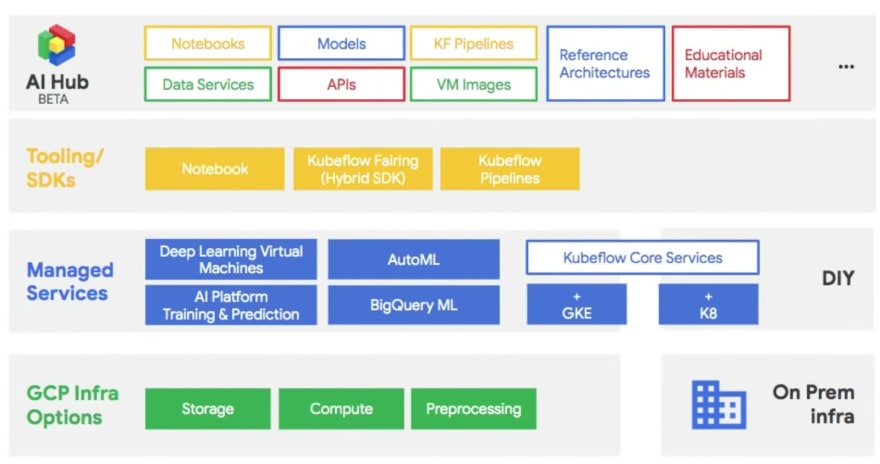








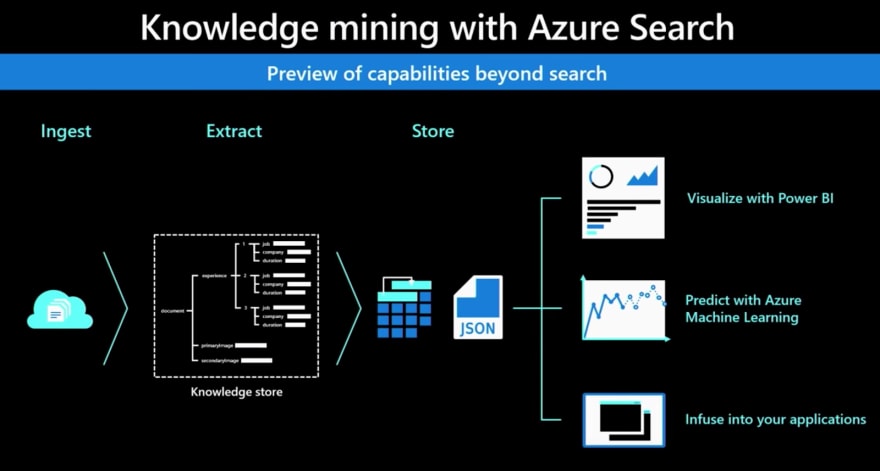
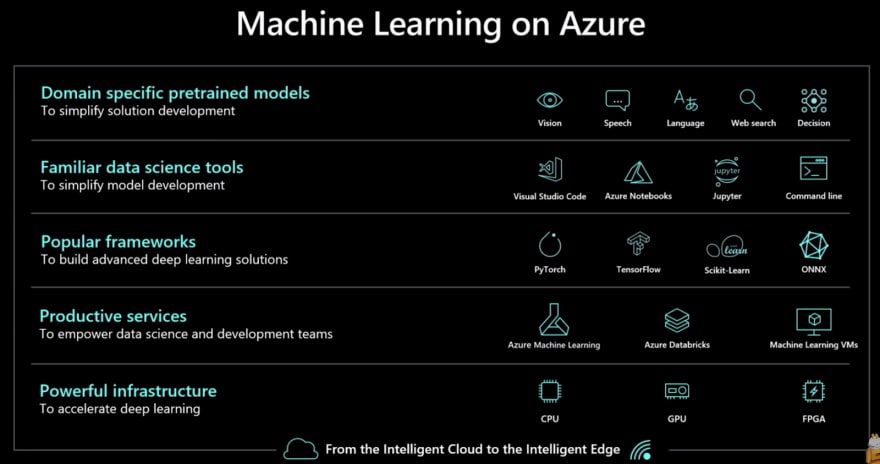
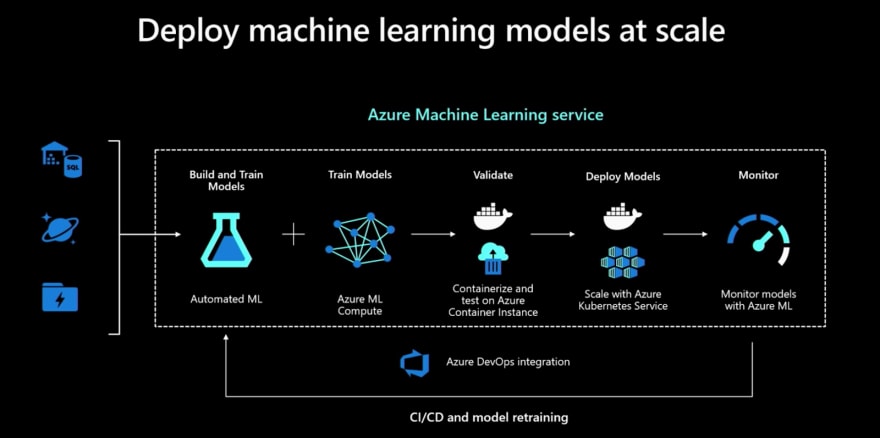




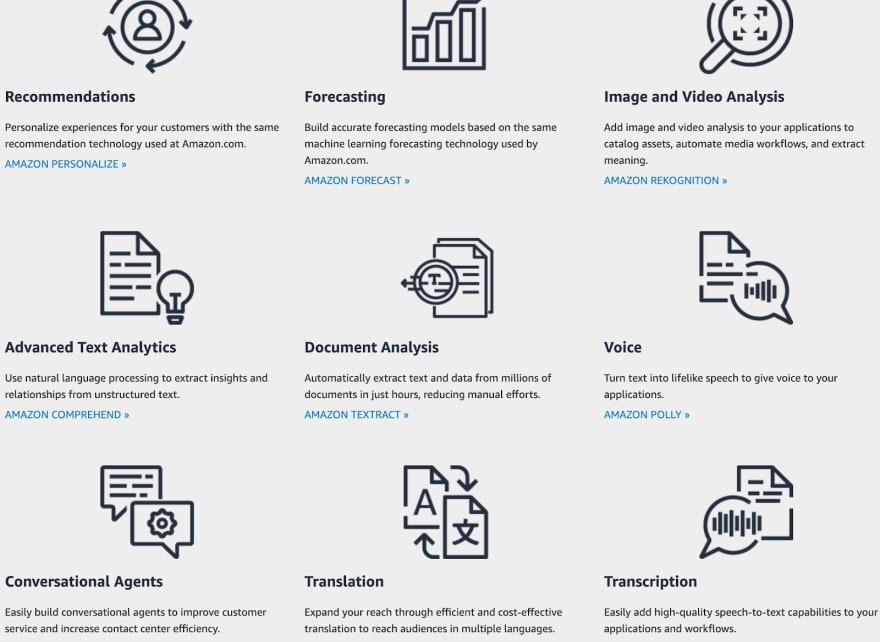







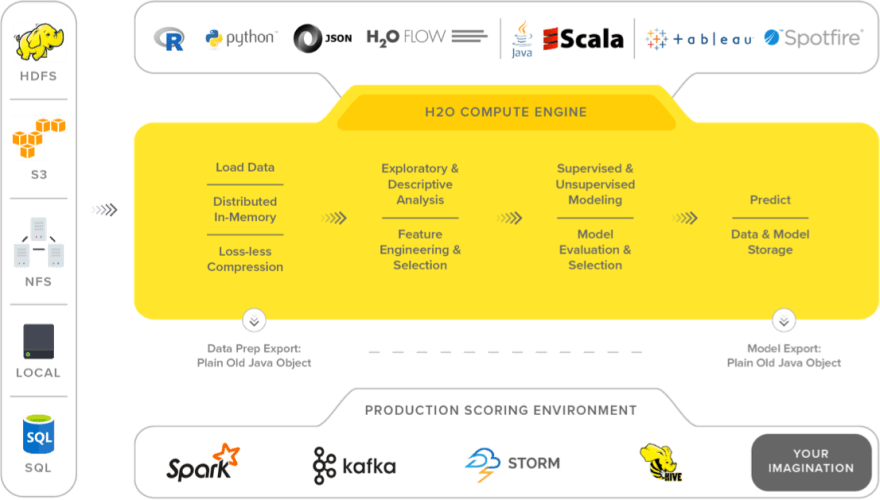
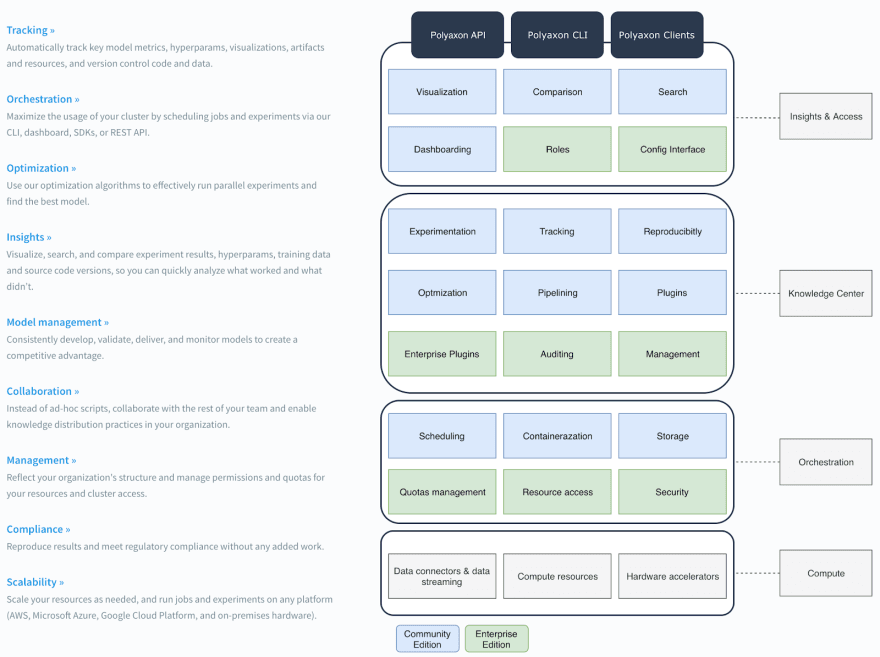
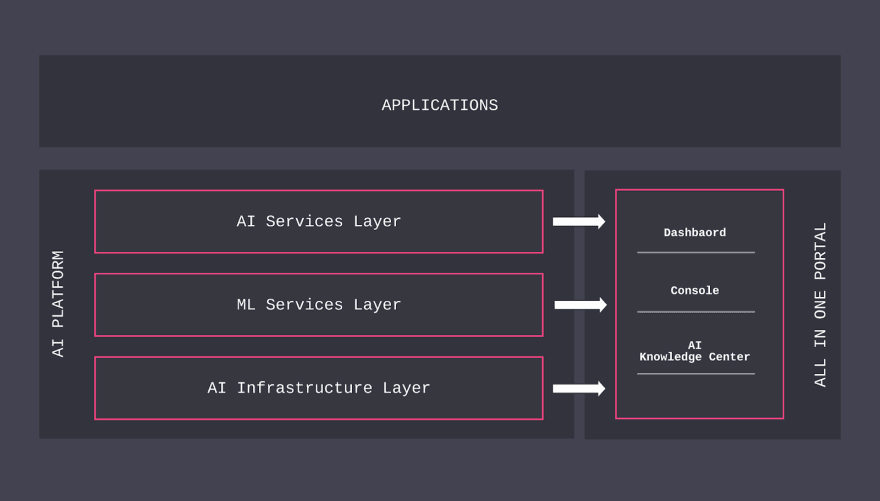
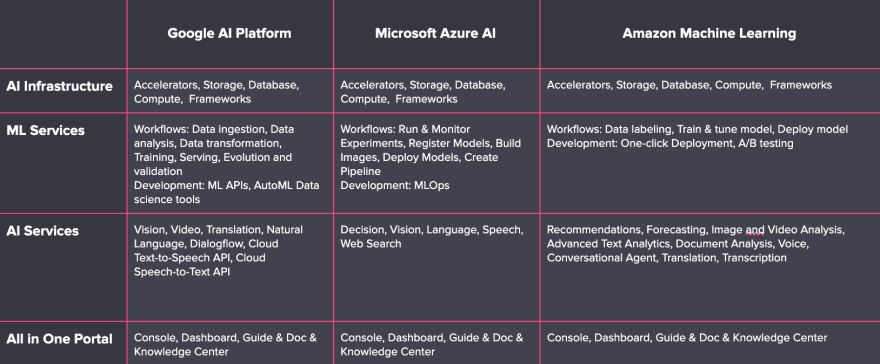






Top comments (0)